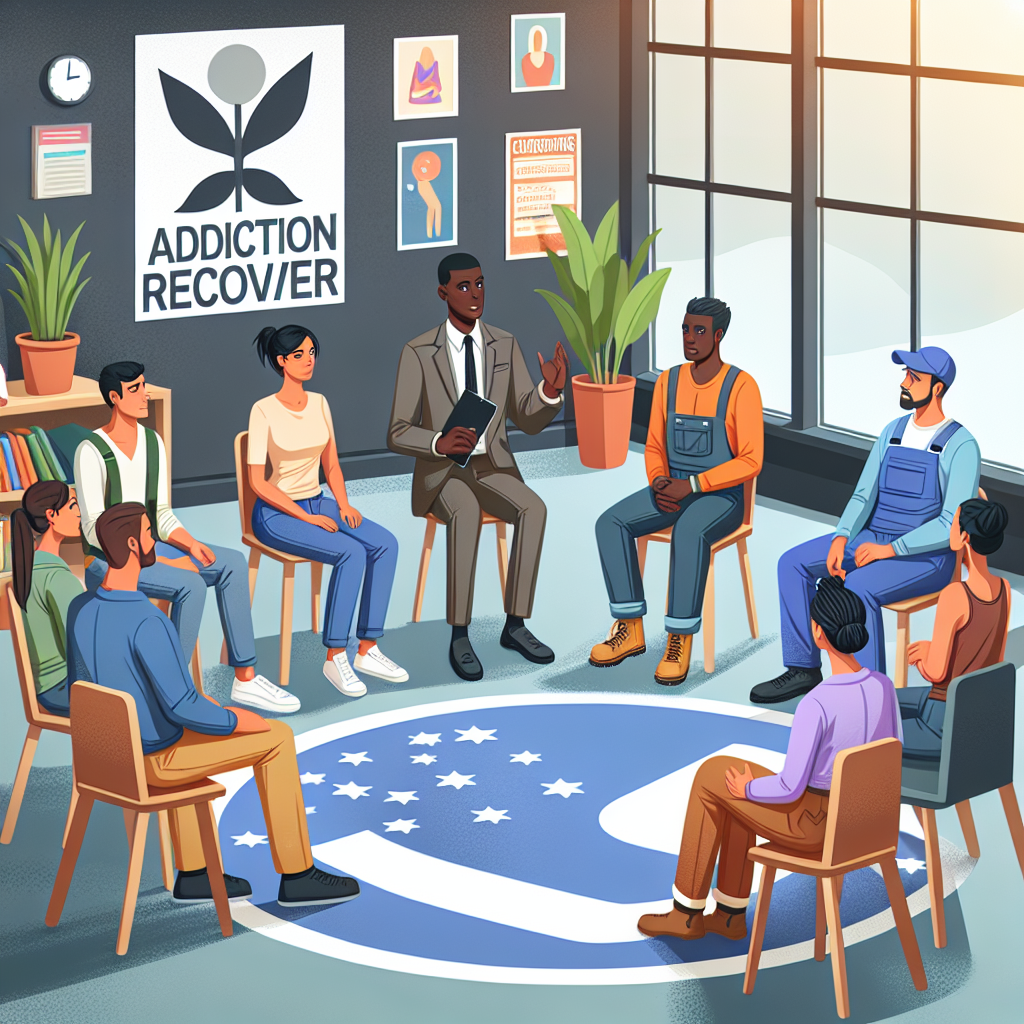-
Table of Contents
“Together We Rise: Building a Strong Network for Cocaine Addiction Recovery”
Introduction

Creating a supportive network for cocaine addiction recovery is a crucial component in the journey towards sobriety and long-term wellness. This network, comprising family, friends, healthcare professionals, and support groups, provides the emotional, psychological, and practical assistance necessary to navigate the challenges of overcoming addiction. By fostering an environment of understanding, encouragement, and accountability, a supportive network helps individuals build resilience, maintain motivation, and develop healthy coping strategies. It also plays a vital role in reducing feelings of isolation and stigma, which are often barriers to seeking and sustaining recovery. Establishing and nurturing these connections can significantly enhance the effectiveness of treatment programs and improve overall outcomes for those striving to break free from the grip of cocaine addiction.
Building Trust and Communication in Your Support Network
Building trust and communication in your support network is crucial for anyone recovering from cocaine addiction. Establishing a foundation of trust and open communication can significantly enhance the recovery process, providing the emotional and psychological support necessary to overcome addiction. The journey to recovery is often fraught with challenges, but with a supportive network, these obstacles can be navigated more effectively.
To begin with, trust is the cornerstone of any supportive network. Trust is not built overnight; it requires time, consistency, and honesty. For someone recovering from cocaine addiction, it is essential to surround themselves with individuals who are reliable and understanding. These individuals could be family members, friends, or support group members who genuinely care about the person’s well-being. Trust is fostered through consistent actions and words. When someone in recovery feels that they can rely on their support network, it creates a safe space where they can express their fears, struggles, and triumphs without judgment.
Moreover, open communication is vital in maintaining and strengthening this trust. Effective communication involves not only speaking but also listening. For those in the support network, it is important to listen actively and empathetically. This means giving the person in recovery your full attention, acknowledging their feelings, and responding thoughtfully. By doing so, you validate their experiences and emotions, which can be incredibly empowering for someone battling addiction.
In addition to listening, it is equally important for the person in recovery to communicate openly about their needs and boundaries. This can be challenging, especially if they fear being judged or misunderstood. However, expressing these needs clearly can prevent misunderstandings and ensure that the support provided is truly beneficial. For instance, if someone in recovery needs space or time alone, communicating this to their support network can help avoid unnecessary tension or conflict.
Furthermore, building trust and communication within a support network also involves setting realistic expectations. Recovery is a long-term process with its ups and downs. It is important for both the person in recovery and their support network to understand that setbacks may occur. Instead of viewing these setbacks as failures, they should be seen as opportunities for growth and learning. By maintaining a positive and realistic outlook, the support network can provide encouragement and motivation, helping the person in recovery to stay committed to their journey.
Another key aspect of building trust and communication is consistency. Consistent support can make a significant difference in the recovery process. This means being there for the person in recovery not just during crises, but also during everyday moments. Regular check-ins, whether through phone calls, texts, or face-to-face meetings, can reinforce the sense of trust and reliability. It shows the person in recovery that they are not alone and that their support network is genuinely invested in their well-being.
Lastly, it is important to recognize that building trust and communication is a two-way street. While the support network plays a crucial role, the person in recovery also has a responsibility to engage actively in the process. This means being honest about their progress, challenges, and needs. It also means being open to feedback and willing to work on improving communication skills.
In conclusion, creating a supportive network for cocaine addiction recovery hinges on building trust and effective communication. By fostering a safe and understanding environment, setting realistic expectations, and maintaining consistency, both the person in recovery and their support network can work together towards a successful and sustainable recovery. The journey may be challenging, but with mutual trust and open communication, it becomes a shared path of hope and healing.
The Role of Family and Friends in Cocaine Addiction Recovery
Creating a supportive network for cocaine addiction recovery is a crucial element in the journey towards sobriety. The role of family and friends cannot be overstated, as their involvement can significantly influence the recovery process. Understanding the dynamics of addiction and the importance of a supportive environment can make a profound difference in the lives of those struggling with cocaine addiction.
First and foremost, it is essential for family and friends to educate themselves about cocaine addiction. Knowledge is power, and understanding the complexities of addiction can foster empathy and patience. Cocaine addiction is not merely a lack of willpower; it is a chronic disease that affects the brain’s reward system, making it incredibly challenging for individuals to quit without support. By learning about the nature of addiction, loved ones can better comprehend the struggles faced by those in recovery and provide the necessary encouragement and understanding.
Communication is another vital component in creating a supportive network. Open, honest, and non-judgmental conversations can help build trust and create a safe space for individuals to express their feelings and challenges. It is important to listen actively and validate their experiences without offering unsolicited advice or criticism. This approach can help reduce feelings of shame and isolation, which are common among those battling addiction.
Moreover, setting healthy boundaries is crucial for both the individual in recovery and their support network. While it is important to offer support, it is equally important to avoid enabling behaviors that may inadvertently contribute to the addiction. This can include avoiding giving money, making excuses for their behavior, or ignoring the problem altogether. Instead, focus on providing emotional support and encouraging healthy habits and activities that promote sobriety.
Encouraging professional help is another key aspect of supporting someone in recovery. Addiction is a complex issue that often requires the expertise of medical professionals, therapists, and support groups. Family and friends can play a pivotal role by helping their loved one find appropriate treatment options and encouraging them to stay committed to their recovery plan. This may involve attending therapy sessions, participating in support groups, or seeking medical treatment for any co-occurring mental health issues.
In addition to professional help, creating a positive and healthy environment can significantly impact the recovery process. This can include removing any triggers or substances from the home, promoting a balanced lifestyle with regular exercise and nutritious meals, and encouraging participation in hobbies and activities that bring joy and fulfillment. A stable and nurturing environment can help individuals focus on their recovery and reduce the risk of relapse.
Furthermore, celebrating milestones and progress, no matter how small, can boost morale and motivation. Recovery is a long and challenging journey, and acknowledging achievements can provide a sense of accomplishment and hope. Whether it is a week, a month, or a year of sobriety, recognizing these milestones can reinforce the commitment to recovery and remind individuals of their strength and resilience.
Lastly, it is important for family and friends to take care of their own well-being. Supporting someone in recovery can be emotionally taxing, and it is essential to practice self-care and seek support when needed. This can include joining support groups for families of addicts, seeking therapy, or simply taking time for oneself to recharge and maintain a healthy balance.
In conclusion, the role of family and friends in cocaine addiction recovery is multifaceted and indispensable. By educating themselves, fostering open communication, setting healthy boundaries, encouraging professional help, creating a positive environment, celebrating progress, and practicing self-care, loved ones can provide the support and encouragement needed for a successful recovery journey. Together, they can help build a foundation of hope, resilience, and lasting sobriety.
Finding and Joining Support Groups for Cocaine Addiction
Creating a supportive network for cocaine addiction recovery is a crucial step in the journey towards a healthier, drug-free life. One of the most effective ways to build this network is by finding and joining support groups specifically designed for individuals battling cocaine addiction. These groups offer a safe space where members can share their experiences, gain insights, and receive encouragement from others who understand their struggles. The process of finding and joining these groups can be transformative, providing the emotional and psychological support necessary for sustained recovery.
Initially, the search for a suitable support group may seem daunting, but numerous resources are available to help. Local community centers, healthcare providers, and online platforms often have information on various support groups. Additionally, organizations such as Narcotics Anonymous (NA) and Cocaine Anonymous (CA) offer meetings specifically tailored to those recovering from cocaine addiction. These groups typically follow a 12-step program, which has been proven effective in helping individuals maintain sobriety. By attending these meetings, individuals can connect with others who share similar experiences, fostering a sense of camaraderie and mutual understanding.
Once a suitable support group is identified, the next step is to attend a meeting. This can be an intimidating experience, especially for those who are new to the recovery process. However, it is important to remember that everyone in the group has faced similar challenges and is there to offer support, not judgment. The first meeting is often the most difficult, but it is also the first step towards building a strong support network. During these meetings, members are encouraged to share their stories, listen to others, and participate in group discussions. This open exchange of experiences can be incredibly therapeutic, helping individuals to feel less isolated and more understood.
Moreover, support groups provide a structured environment where individuals can learn coping strategies and relapse prevention techniques. Experienced members often share valuable insights and practical advice on how to navigate the challenges of recovery. This collective wisdom can be a powerful tool in maintaining sobriety, as it equips individuals with the knowledge and skills needed to handle triggers and cravings. Additionally, many support groups offer resources such as literature, workshops, and guest speakers, further enhancing the recovery process.
Another significant benefit of joining a support group is the opportunity to build lasting relationships. The bonds formed in these groups can extend beyond the meetings, providing a network of friends who can offer support and encouragement in everyday life. These relationships can be a source of strength during difficult times, reminding individuals that they are not alone in their journey. Furthermore, being part of a supportive community can boost self-esteem and confidence, reinforcing the belief that recovery is possible.
In conclusion, finding and joining support groups for cocaine addiction is a vital step in creating a supportive network for recovery. These groups offer a safe and understanding environment where individuals can share their experiences, learn valuable coping strategies, and build lasting relationships. While the process of finding and attending a support group may initially seem challenging, the benefits far outweigh the difficulties. By taking this step, individuals can gain the support and encouragement needed to achieve and maintain sobriety, ultimately leading to a healthier and more fulfilling life.
Leveraging Professional Help for a Stronger Recovery Network
Leveraging professional help is a cornerstone in creating a supportive network for cocaine addiction recovery. The journey to sobriety is often fraught with challenges, and having a robust support system can make a significant difference. Professional help, encompassing therapists, counselors, and medical professionals, provides the expertise and structured guidance necessary to navigate the complexities of addiction recovery. By integrating professional support into one’s recovery network, individuals can access a wealth of resources and strategies tailored to their unique needs.
One of the primary benefits of professional help is the provision of evidence-based treatments. Therapists and counselors trained in addiction recovery employ various therapeutic modalities, such as Cognitive Behavioral Therapy (CBT) and Motivational Interviewing (MI), which have been proven effective in treating substance use disorders. These therapies help individuals understand the underlying causes of their addiction, develop coping mechanisms, and set achievable goals. Moreover, professionals can offer personalized treatment plans that address co-occurring mental health issues, such as depression or anxiety, which often accompany addiction.
In addition to therapy, medical professionals play a crucial role in the recovery process. Physicians and psychiatrists can provide medical interventions that alleviate withdrawal symptoms and reduce cravings, making the initial stages of recovery more manageable. Medications such as disulfiram, naltrexone, and acamprosate have been shown to support long-term sobriety by altering the brain’s response to cocaine. Regular medical check-ups also ensure that any physical health issues related to substance use are promptly addressed, promoting overall well-being.
Furthermore, professional help extends beyond individual therapy and medical treatment. Support groups facilitated by trained professionals offer a communal space where individuals can share their experiences and draw strength from others facing similar challenges. These groups, such as Narcotics Anonymous (NA) or Cocaine Anonymous (CA), provide a sense of belonging and accountability, which are vital components of a successful recovery network. The shared experiences within these groups foster empathy and understanding, reducing feelings of isolation and stigma often associated with addiction.
Transitioning from professional support to everyday life, case managers and social workers can assist in navigating the practical aspects of recovery. They help individuals access resources such as housing, employment, and educational opportunities, which are essential for rebuilding a stable and fulfilling life. By addressing these social determinants of health, professionals ensure that individuals have the necessary tools to sustain their recovery in the long term.
Moreover, leveraging professional help also involves educating family members and loved ones about addiction and recovery. Family therapy sessions can mend strained relationships and build a supportive home environment. Professionals can guide families in setting healthy boundaries, improving communication, and fostering a non-judgmental atmosphere that encourages recovery. When families are well-informed and supportive, individuals in recovery are more likely to feel understood and motivated to stay on their path to sobriety.
In conclusion, creating a supportive network for cocaine addiction recovery is greatly enhanced by leveraging professional help. The expertise and structured support provided by therapists, medical professionals, support groups, and case managers form a comprehensive safety net that addresses the multifaceted nature of addiction. By integrating these professional resources into their recovery journey, individuals can build a resilient foundation for lasting sobriety, ultimately leading to a healthier and more fulfilling life.
Q&A
1. **What are the key components of a supportive network for cocaine addiction recovery?**
– Key components include family and friends, support groups (like Narcotics Anonymous), professional counseling, and community resources such as rehabilitation centers and sober living homes.
2. **How can family and friends best support someone recovering from cocaine addiction?**
– Family and friends can best support by offering emotional support, avoiding judgment, encouraging healthy habits, participating in therapy sessions if needed, and being educated about addiction and recovery processes.
3. **What role do support groups play in cocaine addiction recovery?**
– Support groups provide a sense of community, shared experiences, accountability, and encouragement. They offer a safe space to discuss challenges and successes, reducing feelings of isolation.
4. **Why is professional counseling important in the recovery process?**
– Professional counseling is important because it helps address underlying psychological issues, teaches coping strategies, provides personalized treatment plans, and offers continuous support through the recovery journey.
Conclusion
Creating a supportive network for cocaine addiction recovery is crucial for long-term success and well-being. A robust support system, including family, friends, healthcare professionals, and support groups, provides emotional encouragement, accountability, and practical assistance. This network helps individuals navigate the challenges of recovery, reduces feelings of isolation, and fosters a sense of community and belonging. By leveraging these relationships, individuals are more likely to stay committed to their recovery journey, develop healthier coping mechanisms, and ultimately achieve sustained sobriety.



